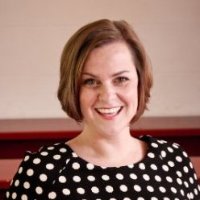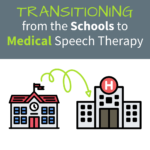Changing Course – Transitioning from School to Medical Speech Therapy
3 min read
I was a public school SLP for eight years. By the time I resigned in 2008, I had managed to get a position at the school of my choice and was lead SLP for the county. My daughter was enrolled in a pre-K class down the hall; we had the same schedule in a great school with summers off. It was exactly the sort of career I thought I wanted as a working mother. But I was miserable.

The educational model wasn’t a good fit for me. I thought about decorating cakes. Briefly. I remember standing in the bakery department of the grocery store watching a woman in a hairnet pipe icing onto a cake, and I thought, maybe I could do that instead. I don’t even bake! But being an SLP in the medical setting? I had always told myself that was out of the question.
It’s now 2016, and I am in my eighth year in the medical setting. Transitioning from school to medical was one of the most nerve-wracking processes I have ever gone through, but it was worth the risk. I enjoy a level of career satisfaction that I would never have imagined. If you are similarly miserable, or even just a little curious, I want to share with you a bit about my journey.
Psychological Factors
The greatest obstacles I encountered when transitioning to a career as a hospital-based clinician were psychological in nature. Anxiety. Insecurity. Fear. Anytime I considered working outside of an elementary school, I had thoughts like:
- I do not like working with adults, and I would miss the kids.
- I do not like hospitals.
- I am not willing to work during the summer.
- I am a fraud. I don’t know enough about medical-based issues, and if I take a position in a hospital setting, my inadequacies will be exposed in the most painful, most awkward way possible.
- I’m too inexperienced, and no one is going to hire me.
For the first decade of my career, I was absolutely certain these statements – these neurotic mantras – were true. Some of them may have even been true, at different times in my career. What they were not is permanent. Now I know:
- I do like working with adults. I love it! I hadn’t particularly enjoyed treating adults as a 24-year-old grad student, but then, I also hated coffee at the age of 24. What can I tell you? My tastes and perspectives changed. Adult clients remember their lives prior to the health changes that landed them in speech therapy. That inspires a level of motivation that school-aged clients are simply not capable of. With a few pediatric outpatients and children of my own, I never think about “missing the kids.”
- I do like hospitals. I do not like sickness or mortality, but they are realities independent of the existence of hospitals. Hospitals are full of cutting-edge technology and an incredible array of passionate professionals. Some people do, in fact, die in hospitals. But others are born, healed, soothed, and comforted. I feel privileged to play a tiny role in the operation of a hospital.
- Summers. This one was a biggie. As a parent, the thought of giving up June and July with my kids filled me with sadness. Then I crunched the numbers and determined that I could work in a medical setting for 25 to 30 hours per week and make roughly the same income I was accustomed to as a full-time, school-based clinician. I ultimately gave up June and July in exchange for jobs that allowed me to work for 3 or 4 days per week. What’s not to like about that? The benefit of two months off did not offset the burden of working ten months in an ill-fitting and dissatisfying job.
- I was not a fraud. I had not conned my university out of my Master’s degree or charmed my way through the Praxis exam. I had the same training as SLPs already working in the medical setting. In school, I had studied and worked hard to meet my goals, and I could do it again.
- Experience is not the only factor. Potential employers look at many facets of an individual to evaluate the positive impact they can have on the patients entrusted to their care.
Professional Development for the Medical Setting
While much of what you do in a medical setting will be different at first, it will not be completely unfamiliar. No one is going to ask you to rebuild a carburetor. You have a degree in this stuff. You are not ignorant about medical-based speech pathology, just inexperienced. So, seek out experiences. Here are a few tips to set you in the right direction:
Look for courses that offer marketable certifications upon completion. You will feel so much more prepared to take on a new role, and you will be able to add some certifications to your resume that prospective employers recognize as in-demand.
- LSVT-LOUD is an intensive dysphonia treatment program for patients with Parkinson’s disease. There is an online version of the course, so you can get the certification on your own terms. Most importantly, patients have such great outcomes with this therapy that it makes for a very rewarding way to spend the workday.
- VitalStim certifies clinicians in the use of neuromuscular electrical stimulation (NMES) for the treatment of dysphagia. Having this certification is another way to make your resume stand out, and the material covered in the course is invaluable. (A first-year clinician recently told me that she learned more about evaluating and treating swallowing in one weekend VitalStim course that she had in all other educational and professional setting combined; quite an endorsement!)
Become more familiar with Modified Barium Swallow Studies (MBSS or VFSS). Since this is definitely not something any of us ever do in the school setting, I’m going to be really nuts-and-bolts with this one:
- Buy an MBSS study guide that includes a DVD. This will enable you to watch swallow studies, quiz yourself, write mock notes, and check your impressions against the guide. I recommend Interpretation of Videofluoroscopic Swallow Studies of Adults by Jeri Logemann if you can find a copy, or take the course.
- Download Tactus Therapy’s Dysphagia Therapy app. It will help you interpret what you see on the MBSS, select appropriate wording for report-writing, and choose which exercises and compensatory strategies to try during treatment.
Focus on being prepared to get through tomorrow. You only have to stay one day ahead of the client. Use his or her needs to direct your treatment, and then go study. Great resources have never been more accessible than they are right now:
- Read SLP-related articles and blog posts. Dysphagia Cafe and Tactus Therapy update their sites regularly with current research and practical tips for implementing evidence-based practice in the medical setting.
- Join special interest groups through ASHA for the message boards. SIG 13 – Dysphagia, SIG 15 – Gerontology, and SIG 2 – Neurogenic Communication Disorders offer useful information for the medical setting.
- Take continuing education courses. In addition to the certification courses mentioned earlier, you can check out speechpathology.com, which offers total access to their online courses for just $99, or ask other SLPs which courses and conferences they have found useful.
For dysphagia-specific information, be sure to read the Top 10 Dysphagia Education Resources for SLPs.
Logistics for Transitioning from School to Medical
Once the psychological and professional development factors have been addressed, there are a few logistical issues to deal with. Assemble the following:
- A current state license to work as an SLP. Some school-based SLPs work under teaching certificates. If that is the case for you, you will need to apply for a state license. Provided you have your CCCs, there isn’t much to this.
- Proof of current ASHA certification. If you have let this lapse, there may be some continuing education requirements to address. Take care of this before job hunting.
- Current CPR certification.
- An updated resume and cover letter with a list of professional references. Make sure the cover letter puts a positive spin on your situation. Emphasize your interest in growing as a professional. Avoid any mention of “getting the %#*!@ out of Dodge.”
If you have been unable to find a job in a medical setting:
- Consider a position at a pediatric outpatient clinic. A peds facility is a great bridge from the school to medical setting because it enables you to work with a familiar age group while gaining working knowledge about issues more relevant to the medical field.
- Cold-call a hospital to inquire as to whether they’re looking for clinicians for weekend coverage. (They are.) These positions are designated PRN, a Latin abbreviation meaning “as needed,” and they are a great way to get your foot in the door. The hospital may provide you with shadowing or training opportunities to get you up to speed for your shifts. Then, when a position opens up, you will be the logical candidate.
There are so many different and exciting areas in which SLPs can work. Your career is a journey, not a destination. Take pleasure in the changing landscape, and be ever mindful to travel toward what excites you, not simply away from what scares you.

